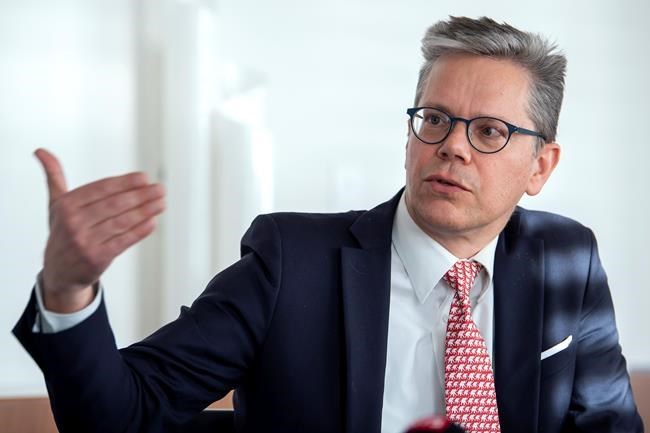
Ambassador Raphael Naegeli speaks after leading the Swiss delegation to talks with Taliban officials in Geneva, Switzerland, Thursday, Feb. 10, 2022. A top Swiss diplomat who met with a delegation from Afghanistan’s Taliban leadership says it expressed an interest in dialogue with the international community and realized “that they must take the first step” to unblock more aid desperately needed in the war-battered country. Raphael Naegeli, Switzerland’s ambassador to U.N. institutions in Geneva, said he met with an 11-member Taliban delegation led by its health minister, Qalander Ibaad, that made little secret of their hopes for more international assistance six months after a lightning-fast ouster of the internationally backed government last summer. (Martial Trezzini/Keystone via AP)
Republished February 11, 2022 - 9:22 AM
Original Publication Date February 10, 2022 - 10:21 AM
GENEVA (AP) — A senior Swiss diplomat who met Thursday with visiting representatives of Afghanistan’s Taliban leaders in Switzerland said the delegation showed an interest in dialogue with the international community. He also noted that they realize “that they must take the first step” to unblock more aid desperately needed in the war-battered country.
Raphael Naegeli said he met an 11-member Taliban delegation led by the acting health minister, Dr. Qalandar Ebad, that made little secret of their hopes for more international assistance six months after their lightning-fast ouster of the internationally backed government.
“They realized that we need some guarantees, some promises,” said Naegeli, who heads the Asia-Pacific division of Switzerland's Federal Department of Foreign Affairs. "They realized that they must take the first step ... They say very openly that they need our aid.”
“I think they are inclined to make some compromises,” he told reporters. “We really sensed an interest of the members of the self-proclaimed government … to create a dialogue with the international community.”
A collapsed banking sector and cash crunch, fallout from the COVID-19 pandemic and drought have compounded the dilemmas for the Taliban leadership that does not have diplomatic recognition through U.N. institutions. It is still officially shunned by many Western nations that have been big donors to Afghanistan in the past.
The delegation was in Geneva this week on an invitation from the humanitarian aid group Geneva Call, which has kept the talks secret and is trying to build the conditions for more aid for the country. The Afghans have not been made available to reporters.
The health minister met with World Health Organization director-general Tedros Adhanom Ghebreyesus this week, and the delegation was to meet with officials from the International Committee of the Red Cross on Friday.
Nasir Andisha, a holdover from the previous government who retains the post of Afghanistan’s ambassador in Geneva, took issue with the invitation in a letter made public on Wednesday, saying it was “questionable at best to invite a high-level Taliban delegation to the table while they routinely and systematically violate the human rights of Afghanistan’s citizens.”
Naegeli, the Swiss ambassador, said the meeting offered an “opportunity” to hear input and exchange messages.
“We expressed very clearly our expectations, notably when it comes to human rights, guarantees for humanitarian aid (deliveries) and the protection of the civilian population,” he said. “We underlined that we will judge the powers in place in Kabul on their acts, not their words.”
___
This story was first published on February 10, 2022. It was updated on February 11, 2022 to correct the title of Swiss diplomat Raphael Naegeli. He is the head of the Asia-Pacific division of the Federal Department of Foreign Affairs, not the ambassador to U.N. institutions in Geneva.
News from © The Associated Press, 2022